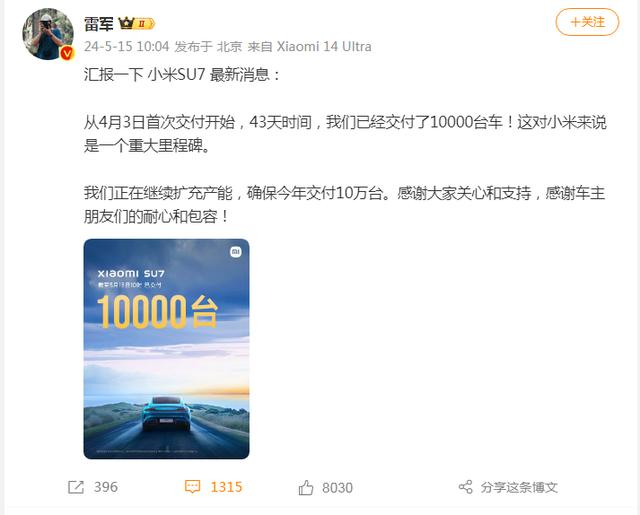On May 15th, Xiaomi Group Chairman Lei Jun announced the latest progress of Xiaomi Motors on his personal Weibo account, stating that the Xiaomi SU7 has delivered 10000 vehicles. Lei Jun stated that the company is continuing to expand its production capacity to ensure the delivery of 100000 units this year.

In February of this year, Xiaomi's smartphone smart factory was built in Changping District, Beijing, with a designed production capacity of 10 million smartphones per year. 78% of the devices are self-developed and can achieve "black light manufacturing". In March, Xiaomi's automobile factory with an investment of over 5 billion yuan landed in Beijing, with 100% automation of its key processes and the introduction of over 700 robots.
"This factory is very different from traditional factories. It's a bit like an office building with few workers and can achieve efficient production." Lei Jun said, "I'm very proud that I can finally be called 'Lei Factory Manager'."
Lei Jun recalled in a previous interview that when he visited the automotive industry, everyone talked about "having more children makes it easier to fight", "fly legs are also meat", and "the East is not bright and the West is bright". At the same time, making multiple cars has become the mainstream practice in the industry. However, Xiaomi emphasized the focus from the beginning, starting from the bottom core technology, and focusing on making a good car.
During the recent Zhongguancun Forum annual meeting, Lei Jun admitted that the surge of orders after the launch of the SU7 made him feel conflicted. On the one hand, the sales were so good that he couldn't believe it, but at the same time, he also felt anxious due to everyone's "ten thousand times magnifying glass like attention.". To this end, Xiaomi Automobile answers various questions of netizens about SU7 on the official account every night, and faces all doubts, rumors and questions directly.
"I just feel like we should have passed the first round of exams," Lei Jun admitted. Next, there are many obstacles that Xiaomi needs to overcome, such as delivery, quality, and service.
Lei Jun also revealed Xiaomi's internationalization plan: in the next three years, it will focus on the domestic market, first do a good job in the domestic market, and then launch the international market three years later.




